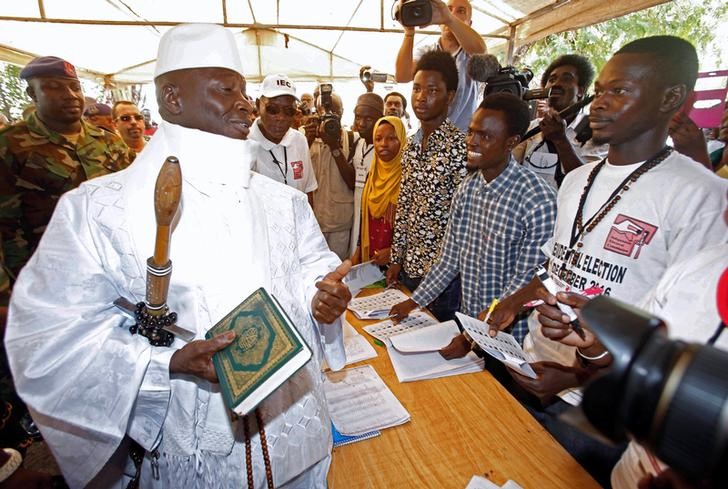By Edward McAllister
BANJUL (Reuters) - Gambia's President Yahya Jammeh was celebrating his 48th birthday in Banjul in May 2013 when he saw a poor street hawker selling peanuts with a child strapped to her back.
Without hesitating, he sent an aide over with a gift: $1,000 in cash, double the tiny West African nation's average annual wage, said Fatou Camara, his former press secretary who saw it.
It was classic Jammeh: impulsive, capricious and generous with his pocket, at least when he was in the right mood.
"He could change a life in minutes," said Camara. "When you are close to him, it is impossible to believe the killings."
For 22 years since he took power in a coup, Jammeh, a former junior army officer, mixed charm and generosity with the threat of violence to maintain a firm grip on power.
But over time, the latter took center stage as Gambia morphed into a police state that tortured opponents, rights groups say. Jammeh's supporters deny such claims, and he frequently rails against the Western interference in Africa.
Jammeh accepted his shock election defeat on Friday, a sharp turnaround for a man who had vowed to rule the tiny West African nation of 1.8 million people for "a billion years".
He has not been seen in public since. It is still uncertain whether he will honor his promise to hand over power.
"FEAR BEGAN TO ERODE"
Friends and victims alike say if there was a defining event which set Jammeh on an increasingly authoritarian path, it was a coup attempt by a vanguard of the military in March 2006.
Musa Saidykhan, then the editor-in-chief of The Independent newspaper, was in bed a few days after the coup when policemen came to arrest him. His paper had reported that Jammeh rounded up more people than the authorities had announced.
Saidykhan was taken to the National Intelligence Agency, a short drive away, next to one of Banjul's white sand beaches that attract thousands of tourists to Gambia.
There, on April 8, in a room that Gambians nicknamed the "Crocodile Hole", agents electrocuted his genitals, beat him with batons, suffocated him with a plastic bag and broke his right hand.
"They said I write with my right hand and that is what is causing the trouble," he told Reuters. Saidykhan left Gambia after his 22-day ordeal and is now social worker in the United States.
The government has repeatedly dismissed allegations of torture. Reuters's calls to officials for comment on this story went unanswered.
Jammeh's quirkier traits, such as his strong belief in supernatural powers, often made international headlines.
He claimed to have a herbal cure for AIDS that only worked on Thursdays. He invited hundreds of women to State House where he administered another herbal remedy for infertility.
In 2009 he arrested hundreds of people for witchcraft.
Gradually, terrified citizens became bolder in expressing dissent, even after hundreds were arrested for protesting in April to May this year.
"The fear began to erode," said Jeffrey Smith from campaign group Vanguard Africa. "People had had enough."
"SOLDIERS WITH A DIFFERENCE"
On July 22, 1994, Jammeh deposed the corrupt regime of Dawda Jawara, who had ruled since independence from Britain in 1960. It was a sudden rise for a quiet man with little education who once grew tomatoes and lettuce in rural Gambia.
"Many of us welcomed the intervention. These were soldiers with a difference, setting the stage for democracy," said Amadou Janneh, Jammeh's communications minister in 2004.
Even then, there were warning signs: the junta arrested politicians from the old government and reinstated the death penalty. In 2000, its forces killed 14 students at an anti-government protest.
Former aides say Jammeh can appear charming and generous. In 2002, he gave a leather bag containing 250,000 dalasis ($6,000) to a boy whose father had been struck dead by lightning, said Ramzia Diab, an advisor who saw it.
On a state visit to Thailand in June 2005, he tipped restaurant staff with multiple $100 bills he drew from a suitcase, said Amadou Janneh, who witnessed the event.
But after the coup attempt, he became more paranoid.
"He could be very jovial and kind and then lose his temper like a mad dog," said Momodou Sowe, 36, an aide to Jammeh between 2003 to 2012 before being jailed for allegedly leaking sensitive information, which he denies.
Armed men arrested Demba Dem, a member of parliament, at his office shortly after the coup. In darkness, agents he could not see beat him with sticks and guns and burned him with hot metal.
Four others interviewed by Reuters got similar treatment that week. Guards dripped melted plastic onto the leg of Yaya Darboe, an officer involved in the coup. Someone filmed it, Darboe said.
Dem and Darboe were taken to Mile 2, a prison complex of white concrete that abuts the main highway into Banjul.
Cells are overcrowded so that inmates cannot lie down. They are served sandy rice and rotting fish. Dozens share one toilet, often a bucket in a corner, several former inmates said.
Former newspaper editor Saidykhan developed severe back pain from his treatment, and in 2010, the regional ECOWAS Court of Justice ordered the Gambian government to compensate him with $200,000.
He is still waiting to receive it.
